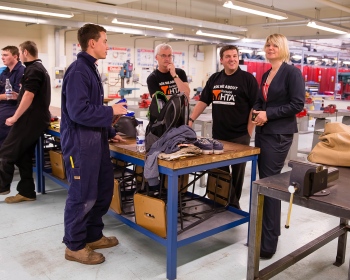Skills shortage — what skills shortage?

After every recession we seem to face a skills shortage. B&ES chief executive Roderick Pettigrew says it doesn’t always have to be like this.
Workloads are rising steadily across the building-engineering-services sector and with them the spectre of skills shortages. It is always the same story after a recession and, as usual, employers are castigated for ignoring the warnings and failing to invest in the necessary training and skills.
 |
However, can we really blame them? Faced with barely enough work even to keep their existing workforce occupied during the longest and deepest recession any of us could remember is it really that surprising firms took a short-term ‘batten down the hatches’ approach?
Companies don’t fail to heed the warnings — they know very well the consequences of cutting back on apprentices and in-service training — but they genuinely believed they had no choice. However, this means that the scramble for appropriately skilled people has begun. And if employers don’t get this right, the whole economic recovery could be in danger.
Smarter
We have to be smarter about how we marshal our limited resources, which means concentrating more carefully on the skills we actually need. There might be a shortage of bodies, but are we making best use of those we already have? Like many things it has to be quality over quantity.
The industry is markedly different from the one that plunged into recession following the banking crash of 2008. Our supply chain is evolving rapidly, and clients are demanding different things. This means that, while traditional skills remain important, individual workers must add new skills to meet changing demands and employers must make sure they have the right portfolio of expertise.
For example, BIM (building information modelling) wasn’t even a spot on the horizon for most contractors in 2008. You could argue it is still a bit of a mystery, but that hasn’t stopped clients and the industry’s biggest customer — the Government — insisting on its use. So we have to learn quickly.
BIM, in one form or another is something contractors have to deal with; as it becomes more common, we will see a revolution in how projects are designed, built and handed over. BIM leads to greater use of offsite fabrication of building services; it forces specialist contractors to step up and contribute to the design process at an earlier stage; it also obliges them to take a closer interest in the ongoing operation of a built asset, which means working closely with FMs.
So it requires new ‘soft’ communication and organisational skills as well as a different technical approach to project design. It is also part of the wider ‘digitalisation’ of our industry. Things that we might have considered to be science fiction just a few years ago are now fairly commonplace, and some of the world’s most innovative technology companies are looking to our sector for business opportunities.
The ‘Internet of things’ is littered with clever new connected systems including intelligent thermostats that learn from users’ behaviour and threaten to revolutionise the way we control heating and air conditioning. It is already possible to link millions of devices to the web and vastly improve access, control and the cost of upgrading and maintaining systems. Research by the McKinsey Global Institute showed that this increased level of connectivity will boost productivity by $33 trillion a year in 2015.
Google, Apple, Dyson and co are all becoming increasingly relevant to building engineers and we have to make sure we remain relevant by ensuring our mechanical expertise is up-to-date and able to add value in this brave new world.
 |
| Skills for the industry — the annual SkillPIPE competition has evolved over the last five years from just metal to all pipework materials — including plastics. |
Since the economic crash of 2008, there has also been a notable shift towards energy efficiency, with a consequently reduced focus on renewables — reflecting the reality of tighter budgets and soaring gas and electricity prices. That is not to say renewables are going away, but the market is calmer and growing more steadily — so our workforce needs to be organised accordingly.
There are fewer newly qualified young people entering the profession, but the influence of ‘new tech’ should make our industry increasingly attractive to future generations by polishing up its image. However, in the meantime we have to address the short-term skills issue.
Modularisation
B&ES, and its subsidiary training agencies BEST and PIPER, is adapting and listening to members by delivering apprenticeship schemes in modularisation of building services, off-site fabrication, ventilation hygiene, project management and environmental technologies — as well as more traditional M&E engineering skills.
Training provision needs to be flexible, which is why we are extending the availability of targeted short courses as a rapid and cost-effective way for contracting businesses to equip their workforces with new skills. B&ES members are best placed to tell us what they need and we must help them plug the gaps.
The sector skills council is also refocusing its work on the areas that give employers and the sector most direct value. It is a much-changed organisation, since the streamlining exercise carried out by the Government, focused on the key areas of National Occupational Standards, apprenticeships and developing qualifications appropriate to our reshaped industry.
B&ES and SummitSkills, like the employers we both serve, experienced the extreme belt tightening of the recession first hand — we were not immune in any sense. This should not be regarded as a wholly negative thing; in fact both organisations — like our members — have emerged leaner and more focused.
This means we are finely tuned to the changes in our marketplaces and are, therefore, better placed to deliver a more appropriately skilled workforce to meet the technical and contractual challenges ahead.
Roderick Pettigrew is chief executive of the Building & Engineering Services Association







